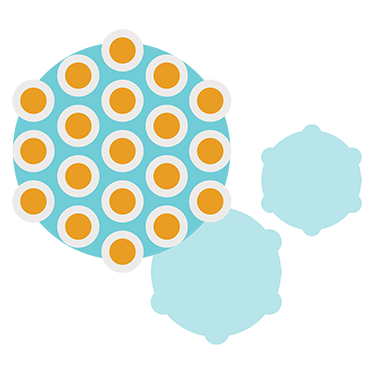Herpes Symptoms
There are two different strains of the herpes virus, HSV-1 and HSV-2. Either strain can present as genital or oral herpes, depending on the points of contact/transmission. Herpes typically presents with symptoms, often called flare ups. While it is incurable, it can be managed with medication.
General Symptoms
- Redness at the site of the infection
- A feeling of burning, or tingling at the infection site
- Itching in or around the genitals
- Red bumps or blisters that progress into ulcers and begin to secrete fluid
- Occasional internal ulcers that cause painful urination
- If outbreaks continue, the blisters will turn into painful sores
- Most sores heal within 1-2 weeks

HSV 1 and 2 are easily contracted, and can be transmitted whether open sores are present or not. Transmission while there are no sores present happens during a time called “asymptomatic shedding.” While HSV 1 may appear more frequently in cases of oral herpes, it can be spread to the genitals. Similarly, as HSV 2 is more commonly found in cases of genital herpes, it is possible to spread to someone’s mouth area during oral sex. It is also possible to be infected with both strains of the virus simultaneously.
Schedule a Test
There are two strains of the herpes virus, HSV-1 and HSV-2. HSV-1 typically causes herpes infections around the mouth, while HSV-2 tends to cause breakouts in the genital area. However, both HSV viruses have been known to cause infection in both locations. The test used to detect herpes infection, the Herpes IgG, detects both strains of the HSV virus and can differentiate between the two. This means your test results will contain two separate results to confirm a positive or negative for each herpes strain. It is recommended that you wait 8 weeks following a potential exposure before you perform this test. If you’ve had a potential exposure within the last two months and are concerned, you would need the HSV IgM test. There is no way to distinguish where the infection lies should you test positive for one or both of the strains of the herpes simplex virus without the presence of confirmed herpes sores.
There is currently no cure for herpes, but medications can be used to treat and reduce the symptoms. These medications are antivirals, and have been shown to keep symptoms at bay so they do not worsen. They also can decrease the number of outbreaks, how many sores are happening/present during outbreaks, and the length of time the sores are present. Taking the medication can decrease the chance of spreading herpes to others, but precaution should still be taken if infected. While herpes may be incurable, it is important to note that herpes causes no significant health consequences.
HSV 1 and 2 are easily contracted, and can be transmitted whether open sores are present or not. Transmission while there are no sores present happens during a time called “asymptomatic shedding.” While HSV 1 may appear more frequently in cases of oral herpes, it can be spread to the genitals. Similarly, as HSV 2 is more commonly found in cases of genital herpes, it is possible to spread to someone’s mouth area during oral sex. It is also possible to be infected with both strains of the virus simultaneously.
Schedule a TestThere are two strains of the herpes virus, HSV-1 and HSV-2. HSV-1 typically causes herpes infections around the mouth, while HSV-2 tends to cause breakouts in the genital area. However, both HSV viruses have been known to cause infection in both locations. The test used to detect herpes infection, the Herpes IgG, detects both strains of the HSV virus and can differentiate between the two. This means your test results will contain two separate results to confirm a positive or negative for each herpes strain. It is recommended that you wait 8 weeks following a potential exposure before you perform this test. If you’ve had a potential exposure within the last two months and are concerned, you would need the HSV IgM test. There is no way to distinguish where the infection lies should you test positive for one or both of the strains of the herpes simplex virus without the presence of confirmed herpes sores.
There is currently no cure for herpes, but medications can be used to treat and reduce the symptoms. These medications are antivirals, and have been shown to keep symptoms at bay so they do not worsen. They also can decrease the number of outbreaks, how many sores are happening/present during outbreaks, and the length of time the sores are present. Taking the medication can decrease the chance of spreading herpes to others, but precaution should still be taken if infected. While herpes may be incurable, it is important to note that herpes causes no significant health consequences.